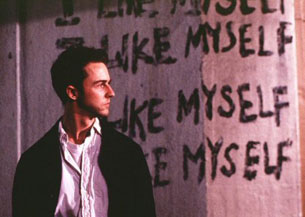Viking Night
Fight Club
By Bruce Hall
February 23, 2010
Ultimately, Tyler manages to bring Marla back into Jack's orbit, forcing Jack to struggle with his allegiance to Tyler and his obvious feelings for Marla. Ever the charismatic, nihilistic firebrand, Tyler has bigger plans for Fight Club than just an underground forum for pent up male aggression. Before long, Jack finds himself at the mercy of forces he helped to create but can no longer control. His sense disgruntlement returns and in ways he could never have predicted, he is forced to stop blaming society for his problems and finally take responsibility for his fate. In the end, Jack comes to realize that Fight Club was just as much a diversion as his television, his treadmill, or his Rislampa wire lamps made of environmentally friendly unbleached paper. It becomes obvious that personal fulfillment and self determination are just that – something that must come from inside an individual and on an intimate level, rather than being dependent on where you work, what you own, who you know or to what group you belong.
Fight Club is one of those movies that seems to give everyone who sees it exactly what they want. Some see a grand philosophical exposition on the themes I've described above, holding up the film as a searing indictment of consumerism gone amok. Others see a mindless orgy of homoerotic violence, while still others see a twisted, post noir romance. To me that's the mark of a great story, when what you see in it depends on your background and values. But it's human nature to project what you already think onto what you see every day. In my mind, Fight Club is just about a lonely guy who does think about all of these things and does feel crushed by them. Yet fundamentally, all he wants to do is all that most of us want - connect with someone. But his over-indulgence in self pity leaves him vulnerable, and lets him become consumed by his own despair. It's a dilemma that at some point in our lives we all can identify with. The story doesn't entirely succeed on all levels, as it occasionally becomes enamored with itself, bogged down by Tyler Durden and his deranged machinations. This dilutes the film's message somewhat and runs the risk of making it seem like an endorsement of aimless, sociopathic aggression.
But I think that when you're using a work of fiction to convey an idea, resorting to extremes can be an effective way of making sure that whether or not your audience understands your point, they at least devote some time to considering it. Many of us do settle for that we can get in life, simply because we're too afraid to risk trying to achieve what we really want. If we have misgivings about it we often appease them with denial, material goods or intellectual pabulum designed to keep us docile and incurious. The extremes depicted in Fight Club are meant to make us consider the choices we have. Many of us are like Jack is when we meet him. We are reluctant to admit that we're unhappy, but lack the will to act - meaning we'll always be miserable. Others – like Tyler Durden – lash out at the world, able to identify the problems in it but unable to offer constructive solutions. Perhaps the best thing we can do is try to keep a sense of perspective on what's truly meaningful and what is nothing more than a distraction to our development.
As Tyler Durden might say, the things you own often end up owning you. You are not your job; you are not how much money you have in the bank, you are not the car you drive, and you are not your 47 inch HDTV. You are for better or worse, what you make of yourself. And your life, for better or worse, will be what you've designed it to be.
Continued:
1
2
3
|
|
|
|




